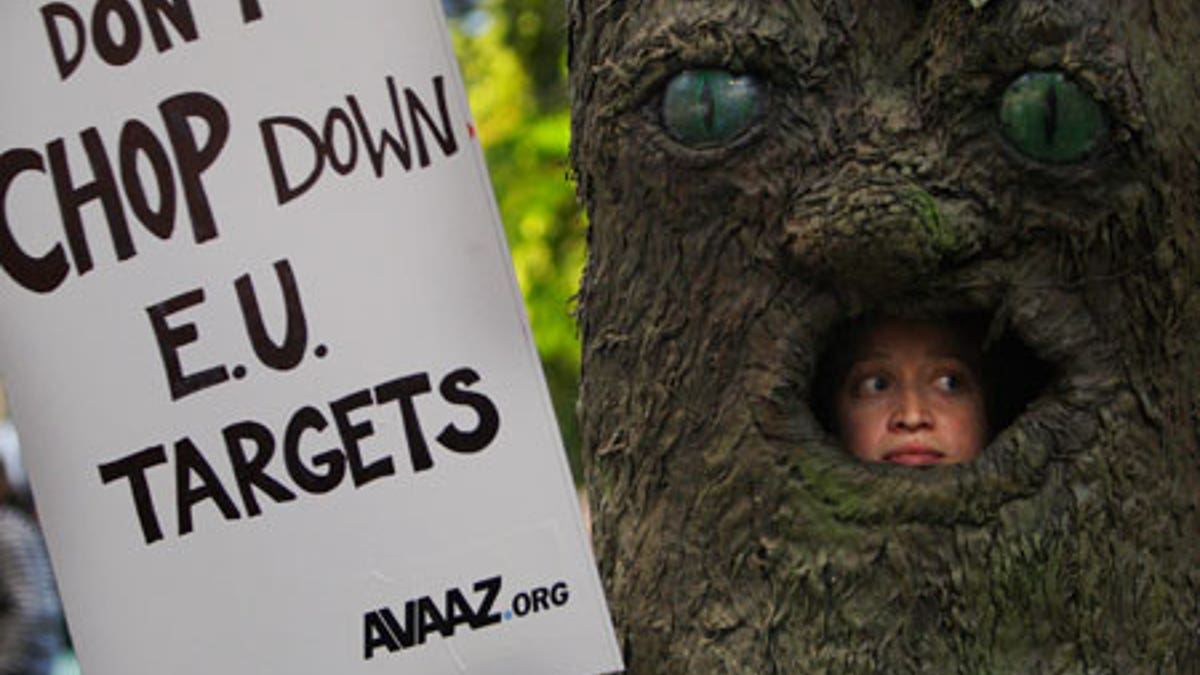
Dec. 8: An activist looks out of a giant tree as he participates in a demonstration against the cutting of trees at the U.N. Climate Summit in Copenhagen. (AP)
As activists from groups as wide-ranging as the Girl Scouts and the World Council on Churches converge on the climate change conference in Copenhagen, some critics say it's turning into a "circus" sideshow, with 20,000 attendees creating an international echo chamber of climate piety.
Apart from the main proceedings, there are 254 side events, 231 exhibits and more than 200 press conferences already on the schedule — meaning there are about 700 extra events keyed up for the 12-day conference.
"These circuses get bigger and bigger," said Myron Ebell, director of energy and global warming policy at the Competitive Enterprise Institute, a Washington think tank. "It's a big echo chamber — they're just reassuring themselves."
Some 15,000 workers from non-governmental organizations are expected to attend the conference, and scores of them will have their hands full covering urgent topics like greenhouse gases and drought. But others are running closer to the fringe:
• The delegation from Bolivia will be pushing for a Universal Declaration of Mother Earth Rights, which the country's President Evo Morales says "supersede the rights of human beings."
• A group called GenderCC (Women for Climate Justice) rejects using distractions like "numbers" and "target dates" to track and fight climate change, and doesn't appear very interested in the environment itself. Instead, it hopes to implement "gender-mainstreaming" and ensure that the U.N. guarantees the fullest participation of "feminist scientists" at every level.
• The Brahma Kumaris World Spiritual University is putting on an exhibit to "explore how thoughts affect matter and how a shift in consciousness can transform current deteriorating conditions" for the environment.
• International Planned Parenthood is putting on a show about how to increase contraception in the third world to stop babies — who later become adults — from ruining the environment.
• Many others appear redundant, including nine events on climate justice and 39 on a single U.N. cause celebre called REDD — reducing emissions from deforestation in developing countries — which adds up to well over a 40-hour workweek of seemingly repetitive hearings on a single topic.
These 700 events will run five or six at a time nearly non-stop in Copenhagen — a much tougher schedule than the one U.N. delegates will have to face during their negotiations (they get a 2-hour lunch break every day).
U.N. officials say it's vital that NGOs and activists attend the conference because the fate of the planet is not just in the hand of politicians — it's in the hands of citizens as well.
But oddly enough, U.N. officials gave FoxNews.com an extremely low estimate of the attendees expected, saying only about 6,000 representatives from NGOs, inter-governmental organizations and other approved U.N. organizations would be coming. An e-mail sent to those groups Nov. 25 by the U.N.'s top climate official, Yvo de Boer, shows they are bracing for a crush of at least 14,000 such delegates.
Some critics say that vast attendance is to be expected at the world's premiere conference on climate change, where active groups can meet and exchange information — but they say it still looks like "overkill."
"They've always been a big political show, but they've gone from being that to being far more of a 'We all care' jamboree," said Roger Bate, the Legatum Fellow in Global Prosperity at the American Enterprise Institute.
But the humming schedule makes sense, some climate experts say, as other vital topics at the center of attention are naturally the focus of countless academic events and conferences.
"If you were to look at think tanks in Washington having events on health care policy, I'm sure you would find at least that number of events over the last weeks and months," said Nigel Purvis, a climate negotiator in the Clinton and George W. Bush administrations.
"Many of those events will be fairly similar, but a fair number of them will present very opposing viewpoints," said Purvis, now the president of the consulting firm Climate Advisers. "It's all about discourse, education, getting the facts out there, educating folks."
Some 58 nations will also be holding official events, from global powers like China, India and the U.S. to minuscule island nations like Kiribati and Tuvalu, which have become poster-children for the entire climate-change movement.
"Each country wants to show that their diplomats are leading the way, are really deeply involved in leading negotiations," said Ebell, who believes little will be achieved in Copenhagen.
"It would save a lot of work and the carbon footprint would be much smaller ... if they didn't bother to go to Copenhagen," he said."
